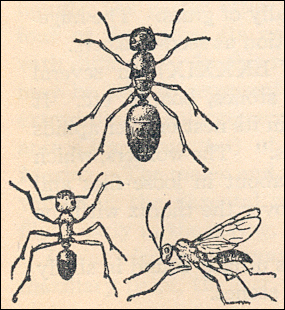
Various human cultures have insisted that their members act only for the welfare of the state. Although the excesses so often generated by this philosophy are well documented, few human societies have gone to the extremes almost universal among ants.
From a biological perspective, ants are an extremely successful group, practicing a way of life so unsatisfactory for people. In the dominant pattern among ants, males are responsible for one thing—fertilizing the queen ant, who devotes her life to laying eggs. Fertilization only needs to occur once, since the queen stores enough sperm to last throughout life. Once the male has performed his duty, he is superfluous—and often done away with. The other members of the nest are genetically female, although they can't reproduce. Their sole function is to tend to the needs of the colony, allowing it to successfully produce a new crop of queens and males to carry on the heritage.
Ants demonstrate well the difference between amoral nature, where there
is no right or wrong, and human society with its moral and immoral aspects. 
Contributor: Arthur H. Harris, Laboratory for Environmental Biology, Centennial Museum, University of Texas at El Paso.
Desert Diary is a joint production of the Centennial Museum and KTEP National Public Radio at the University of Texas at El Paso.

Carpenter ants. After Lutz (1921).